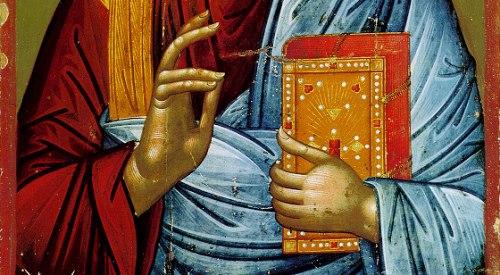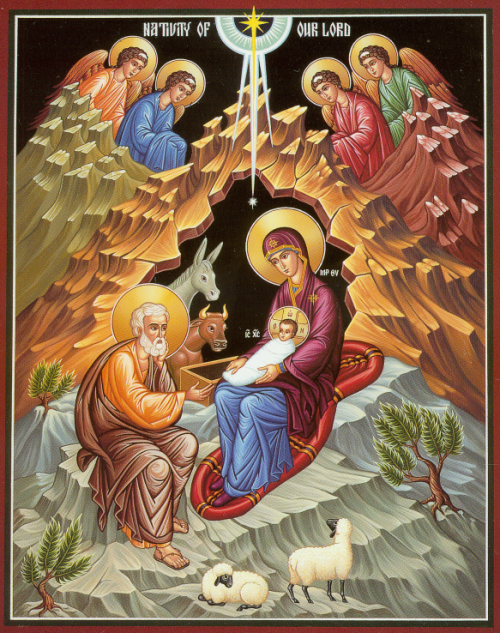Christ is Born! Glorify Him!
Sunday before Theophany of Christ
Apodosis (Leavetaking) of the Nativity of Christ
Venerable Melania the Younger of Rome; Hieromartyr Zotikos of Rome, the friend of
orphans; Blessed Theophylact, Archbishop of Ochrid

The Nativity of Our Lord and Savior Jesus Christ
What is an Apodosis (or Leavetaking)?
The the apodosis (also called leavetaking) is the final day a feast is celebrated in the Church. On the apodosis, most elements of the festal services are appointed to be served again. An afterfeast is a period of time following certain major feasts of the Christian year during which the feast continues to be celebrated. The liturgical life of the Church reflects this extended celebration by continuing to express the themes of the feast in the divine services celebrated during the afterfeast.
Source: Orthodoxwiki.
St. Stephen the Proto-Martyr (First Martyr) Divine Liturgy on December 26 at 6:30pm

St. Stephen was a Jew living in the Hellenic provinces, related to the Apostle Paul and one of the first seven deacons ordained by the Apostles to serve the Church in Jerusalem (thus making him an Archdeacon). In the words of Asterias: St Stephen was “the starting point of the martyrs, the instructor of suffering for Christ, the foundation of righteous confession, since Stephen was the first to shed his blood for the Gospel.”
The Holy Spirit worked powerfully through his faith, enabling him to perform many miracles and always defeat those who would dispute with him. The Jews in their hatred of St. Stephen lied about him to the people, but St. Stephen with his face illumined reminded the people of the miracles God had worked through him and even rebuked the Jews for killing the innocent Christ.
The people were enraged by what they thought was blasphemy and ‘gnashed their teeth’ at Stephen. It was then that he saw his Christ in the heavens and declared it so. Hearing this, they took him outside the city and stoned him to death, with his kinsman Saul (later St. Paul) holding their coats while they did it. Afar off on a hill was the Virgin Mary and St. John the Theologian who witnessed this first martyrdom for the Son of God and prayed for him while he was being stoned. This occurred about a year after the first Pentecost.
Source: OrthodoxWiki.
St. Basil and Circumcision of Christ Divine Liturgy on Monday, January 1, 2018 at 9:00am

Basil was born about 330 at Caesarea in Cappadocia. While still a child, the family moved to Pontus; but he soon returned to Cappadocia to live with his mother’s relations, and seems to have been brought up by his grandmother Macrina. Eager to learn, he went to Constantinople and spent four or five years there and at Athens, where he had the future emperor Julian for a fellow student and became friends with Gregory the Theologian.
It was at Athens that he seriously began to think of religion, and resolved to seek out the most famous hermit saints in Syria and Arabia, in order to learn from them how to attain enthusiastic piety and how to keep his body under submission by asceticism.
After this we find him at the head of a convent near Arnesi in Pontus, in which his mother Emily, now a widow, his sister Macrina and several other ladies, gave themselves to a pious life of prayer and charitable works. Basil sided with those who overcame the aversion to the homoousios in common opposition to Arianism, thus drawing nearer to Saint Athanasius the Great.
He was ordained presbyter of the Church at Caesarea in 365, and his ordination was probably the result of the entreaties of his ecclesiastical superiors, who wished to use his talents against the Arians, who were numerous in that part of the country and were favoured by the Arian emperor, Valens, who then reigned in Constantinople.
Read St. Basil’s full biography on the Orthodoxwiki website.
Living the Orthodox Faith Class Continues Wednesday, January 10 at 7:00pm
“Living the Orthodox Faith” will look at why our Church does things the way it does, and how to do it properly. We will learn about the sign up the cross, how to enter the Church properly (candles and veneration), how to make a home altar, and more. This is a very practical class, not theological as much as how to live the Orthodox life as an Orthodox Christian.
Can’t make the class? Join in on Facebook Live! You can also view last week’s class too.
Classes will be suspended during the Nativity and Theophany Season and resume in early January.
Calendar At A Glance
December
Nativity (Christmas) Worship Schedule
- Tuesday, December 26, 2017 6:30pm. Divine Liturgy St. Stephanos the First Martyr
January
- Monday, January 1, 2018 9:00am Divine Liturgy St. Basil the Great and Circumcision of Christ
- Friday, January 5, 2018 9:00am/10:00am. Royal Hours and Vesperal Liturgy of St. Basil
- Saturday, January 6, 2018 9:00am/10:15am. Divine Liturgy and Blessing of the Waters
- Wednesday, January 10, 2017 7:00pm. Living the Orthodox Faith Class
- Sunday, January 14, 2017 Cutting of the Vasilopita (St. Basil’s Bread) after Liturgy
Why More Liturgies?
Because we are Orthodox, and the entire Orthodox Christian life begins with the worship of God. In worship we find the well of living water that nourishes our soul and gives us life, and that we take into every corner of our lives outside of the Church.
Another reason is that when we honor the Saints we invite them to be present with us.
Wisdom From The Elders
…’O Lord, have I not asked you to free me from this anger?’ And the Lord answered, ‘Yes, Philip, and for this reason I am multiplying the occasions for you to learn.’
“Beginning to pray” by Anthony Bloom
Above all let us be convinced that nothing can happen to us apart from the providence of God.
Dorotheos of Gaza
The demons want us to enter into dialogue with them We must do everything we can to avoid this. The only way to do this is to totally ignore all their suggestions, to not pay them any attention.
Elder Sergei of Vanves
Nothing is so conducive to unity as rejoicing about the same things and holding to the same purpose.
Dorotheos of Gaza
We must struggle, because without struggles we do not obtain virtues.
Elder Ieronymos of Aegina
The message of this universal temptation that attacks men today—quite openly in its secular forms, but usually more hidden in its religious forms—is:Live for the present, enjoy yourself, relax, be comfortable
Fr. Seraphim Rose
Remember in Your Prayers
Rosie
Jill
Connie
Sean Helgeland (great nephew to Steve and Anne Brietenbach)
Kathryn
Jeremy
Robert
Jane
Theodora
Baby Brynn L.
Micheal
Haralambos
Lillian
Presbytera Rosy
Valentina
John
Eva W.
Barbara
Angela
Sonya
Kenneth
Carol Ann
Matthew
Chrysostom
Tim
Ron
Ivy-Jean
Pat
Christina
Maria Louise
Maximos
Marian
Photini
Nicholas
Sarah
Petronia (Wife of Phil Pappas)
Constantine Houpis
Anna Marie Smith Baker
Ron Chromulak
Beverly Chromulak
Katerina
Loucine Kassis
Mary Kassis
Baby Maximus
Christine
Maria
Annette Star
Claire Livaditis
Eva Chandilles
Baby Dani
Scott Nedoff
Anthony Mourgis
John Hansen
James Hord
Tom
How should we pray for the sick? Remember them daily. Say their names (first names are sufficient) and ask God to bestow mercy and grace on them.
Add or remove names and print this list for easy reference during your prayer time on the St. Peter website.
Sunday Readings

Epistle
For the Sunday before the Theophany
All those on earth worship thee and sing unto Thee: Alleluia to God, O all the earth.
The Reading is from the Second Epistle of St. Paul to St. Timothy. (4:5-8)
Timothy, my son, always be steady, endure suffering, do the work of an evangelist, fulfill your ministry. For I am already on the point of being sacrificed; the time of my departure has come. I have fought the good fight, I have finished the race, I have kept the Faith. Henceforth there is laid up for me the crown of righteousness, which the Lord, the righteous judge, will award to me on that Day, and not only to me but also to all who have loved His appearing.
Gospel
For the Sunday before the Theophany
The Reading is from the Holy Gospel according to St. Mark. (1:1-8)
The beginning of the Gospel of Jesus Christ, the Son of God. As it is written in the prophets, “Behold, I send My messenger before Thy face, who shall prepare Thy way; the voice of one crying in the wilderness: Prepare the way of the Lord, make His paths straight.” John the Baptizer appeared in the wilderness, preaching a baptism of repentance for the forgiveness of sins.
And there went out to him all the country of Judea, and all the people of Jerusalem; and they were baptized by him in the river Jordan, confessing their sins. Now John was clothed with camel’s hair, and had a leather girdle around his waist, and ate locusts and wild honey. And he preached, saying, “After me comes He Who is mightier than I, the thong of whose sandals I am not worthy to stoopp down and untie. I have baptized you with water; but He will baptize you with the Holy Spirit.”


